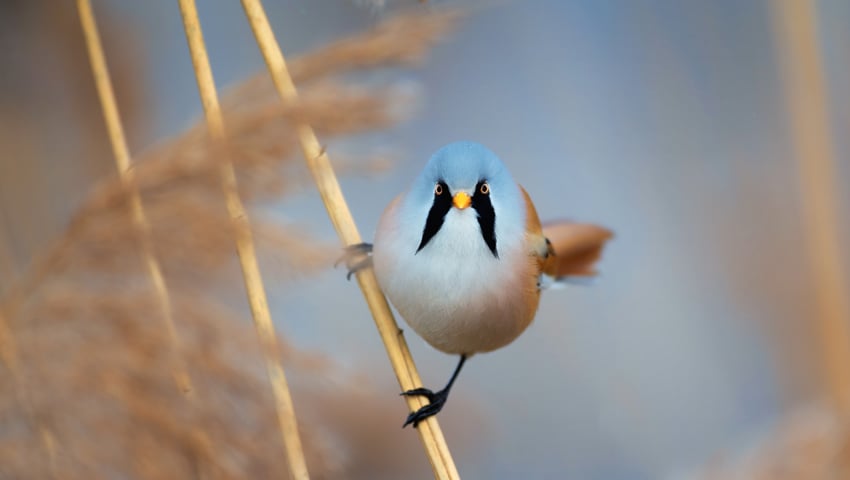Yesterday, on World Wetlands Day, the RSPB celebrated an incredible year for wetland wildlife across the UK, including the breeding success of bearded tits on RSPB nature reserves.
Figures revealed today demonstrate that 25 years of meticulous reedbed management at RSPB Blacktoft Sands in East Riding of Yorkshire has paid off with around 120 pairs of bearded tits producing approximately 500 young in 2024 – more than double the breeding success rate of previous years. Back in 2002, the population had declined to an estimated 45 pairs, raising only about 150 young. Whilst their breeding population once reached a low of just two pairs in England during the 1940s, the nature conservation charity heralds wetland restoration as a key factor in the species’ comeback.
The RSPB is highlighting the importance of wetlands for wildlife and people. These precious habitats play a crucial role in supporting countless species and are globally important for migratory birds along the East Atlantic Flyway migratory route. The vital network of wetlands also combats climate change by locking away carbon and helping to reduce the risk of flooding. Conservation efforts to restore and protect wetlands are essential for safeguarding some of our most threatened species and protecting local communities.
Bearded tits are orangey-brown, long-tailed birds that are usually seen flying rapidly over reedbeds. Males have distinctive black ‘moustache like’ facial markings, making them easily recognisable and are affectionately called ‘Beardies’ by bird enthusiasts. They are sociable and noisy, with their ‘ping’ calls often being the first clue of their otherwise elusive nature.
The unique-looking birds are totally dependent on reedbeds for survival, but precious coastal reedbeds are vulnerable to the effects of climate change. To improve the ecological condition of reedbeds at Blacktoft Sands, the reserve team embarked on a meticulous programme of reedbed management to restore the deteriorated habitat and their efforts have paid off with the incredible number of bearded tits recorded last year.
Nationally, bearded tit numbers have increased from 400 pairs in the UK four decades ago to around 700 breeding pairs in the UK by 2021, almost doubling over the last 25 years. The creation and conservation of wetlands has helped drive this success – winter reed cutting has transformed the fortunes of bearded tits by providing ideal breeding habitat – however, RSPB conservationists stress that it is still a relatively rare bird in the UK.
Pete Short, RSPB Humber Estuary Reserves Manager, said, “Watching our bearded tits darting around the reedbeds is a special nature spectacle. Carefully managing wetlands is important for some of our rarest species and we’re delighted that our management of the reedbeds is paying off. Wetlands are important to us all and without them we would lose so much.
“RSPB Blacktoft Sands hosts England’s largest intertidal reedbed and is a fantastic example of why wetlands are so important and why, on World Wetlands Day, it is urgent that we raise national and global awareness about wetlands in order to reverse their rapid loss and encourage actions to conserve and restore them.
“The success of species like the bearded tit shows that we can make a difference and why we need to re-double our efforts to preserve our precious wetlands. We are urging policymakers and government to recognise the critical role of wetlands, not only for wildlife but also for combating climate change”.
Habitat management benefits other species too, with continued population increases of rare breeding birds such as spoonbill, bittern and common crane. Spoonbills had a particularly spectacular year on RSPB nature reserves, with a total of 38 pairs fledging at least 74 young. These numbers came alongside news that spoonbills nested for the first time since the 17th century at RSPB Ouse Washes, where three pairs fledged three young, a major win for a species previously driven to extinction in the UK.
